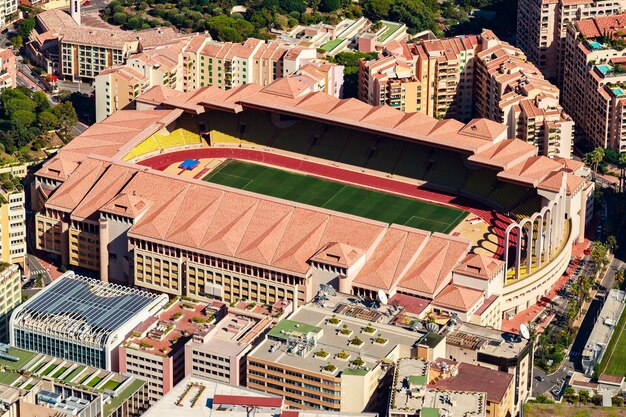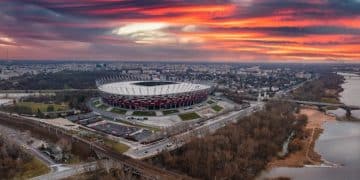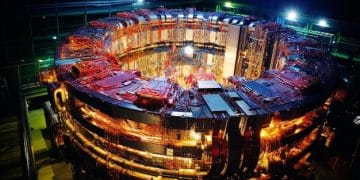La Liga’s Economic Impact: How Spain Benefits Economically

La Liga’s economic impact in Spain is substantial, contributing billions to the country’s GDP through television rights, job creation, tourism, and associated industries, making it a cornerstone of Spain’s economy.
La Liga’s economic impact: How the league benefits Spain’s economy is a topic of immense importance when assessing the contribution of sports to national prosperity. This article delves into the specifics of how La Liga, Spain’s premier football league, acts as a significant economic engine for the country, impacting everything from employment rates to tourism revenue.
Understanding La Liga’s Role in Spain’s Economy
La Liga is not merely a sports league; it is a powerful economic force that reverberates throughout Spain. From the bustling city centers to the rural towns, its influence is undeniable. This section aims to dissect the various ways in which La Liga contributes to the economic well-being of Spain.
We’ll explore not just the direct revenues generated through ticket sales and merchandise, but also the indirect benefits that extend to tourism, hospitality, and even infrastructure development. By understanding the multifaceted nature of La Liga’s economic footprint, we can appreciate its true significance.
Direct Revenue Generation
La Liga generates substantial direct revenue through several key channels. These revenues are not only vital for the league’s sustainability but also contribute significantly to Spain’s GDP.
- Broadcasting Rights: The sale of broadcasting rights globally brings in billions of euros annually.
- Ticket Sales: Millions of fans attend La Liga matches each season, generating significant revenue through ticket purchases.
- Merchandising: The sale of team jerseys, memorabilia, and other merchandise adds another layer of direct income.
- Sponsorships: Corporate sponsorships and partnerships provide crucial financial support for teams and the league.
These direct revenue streams form the backbone of La Liga’s financial contribution, providing the resources necessary for the league to thrive and further expand its influence.
In summary, La Liga’s role extends far beyond just football. Its direct revenue streams are critical for Spain’s economic health, driving income and enabling further growth.
Job Creation and Employment Opportunities
Beyond direct revenue, La Liga is a significant job creator, supporting numerous employment opportunities across various sectors. The impact on employment is a crucial aspect of understanding the league’s economic contribution.
These jobs aren’t limited to just the players and coaching staff; they extend to stadium personnel, security, hospitality workers, and employees in related industries like media and transportation. The creation of these jobs is a tangible benefit for Spanish citizens and their families.

Employment Sectors Benefiting from La Liga
Several sectors see a boost in employment thanks to La Liga. Each sector plays a vital role in the overall functioning of the league and its impact on the Spanish economy.
- Hospitality: Restaurants, hotels, and bars near stadiums benefit from increased traffic on match days.
- Transportation: Taxi drivers, bus operators, and train services see increased demand during games.
- Media: Journalists, broadcasters, and photographers find employment covering La Liga events.
- Security: Security personnel are needed to ensure the safety of players and fans at stadiums.
These sectors thrive due to the consistent demand generated by La Liga events, providing stable employment opportunities for many Spaniards.
La Liga’s employment opportunities span numerous sectors, showing its broad impact on Spain’s economy. The league is a vital engine for job creation.
Tourism Boost from La Liga
La Liga is a significant draw for tourists, attracting football fans from around the globe to experience the excitement of Spanish football firsthand. The influx of tourists translates to significant economic benefits for Spain.
These benefits go beyond just ticket sales; tourists spend money on accommodation, food, transportation, and other leisure activities, injecting significant capital into the Spanish economy. The league’s international appeal is a key factor in promoting Spain as a desirable tourist destination.
Economic Impact of Football Tourism
Football tourism has a direct and measurable impact on Spain’s economy. Understanding these specifics helps to quantify La Liga’s contribution to the tourism sector.
- Hotel Occupancy: Hotels in cities hosting La Liga matches experience higher occupancy rates.
- Restaurant Revenue: Restaurants and cafes see a surge in business on game days.
- Local Businesses: Souvenir shops and other local businesses benefit from increased tourist traffic.
- Transportation Services: Airlines, trains, and buses experience higher demand due to football-related travel.
The economic impact of football tourism is substantial, providing a significant boost to local economies and supporting thousands of jobs.
La Liga’s global appeal drives tourism, benefiting numerous sectors of the Spanish economy. Its role as a tourist draw is undeniable.
Infrastructure Development Driven by La Liga
The presence of La Liga clubs often spurs infrastructure development in and around their stadiums, leading to long-term economic and social benefits for the surrounding communities.
This development includes improved transportation links, upgraded public spaces, and enhanced amenities. These investments not only benefit football fans but also improve the quality of life for local residents, creating a lasting positive impact.
Examples of Infrastructure Improvements
Several notable examples illustrate how La Liga clubs have driven infrastructure improvements in their areas.
- Stadium Upgrades: Clubs often invest in upgrading their stadiums to enhance the fan experience.
- Transportation Links: New roads, railways, and bus routes are often developed to improve access to stadiums.
- Public Spaces: Parks, plazas, and other public spaces are often improved as part of stadium development projects.
- Commercial Development: New shops, restaurants, and hotels often spring up around stadiums, creating new economic opportunities.
These improvements contribute to the overall attractiveness and functionality of the areas surrounding La Liga stadiums, providing lasting benefits for residents and visitors alike.

La Liga’s presence fosters infrastructure development, enhancing communities and creating lasting benefits. These improvements contribute to economic growth and improved quality of life.
La Liga’s Global Branding and International Recognition
La Liga’s global branding and international recognition are powerful assets that contribute to Spain’s overall image and economic prospects. The league’s popularity extends far beyond Spain’s borders, reaching millions of fans worldwide.
This global presence helps to promote Spain as a modern, vibrant, and culturally rich nation. The international exposure generated by La Liga events and broadcasts enhances Spain’s brand and attracts foreign investment, boosting the economy.
Benefits of International Recognition
The international recognition that La Liga enjoys brings several key benefits to Spain.
- Increased Foreign Investment: Companies are more likely to invest in Spain if they see it as a hub of sports and entertainment.
- Enhanced Tourism: La Liga’s global appeal attracts tourists from around the world.
- Positive National Image: The league’s success reflects positively on Spain as a whole.
In short, La Liga’s global recognition strengthens Spain’s position on the world stage, driving economic growth and cultural exchange.
La Liga’s global branding enhances Spain’s image, attracting investment and tourists. The international recognition is a vital asset.
Challenges and Opportunities for Growth
Despite its significant economic contributions, La Liga faces challenges and opportunities for further growth. Navigating these challenges and capitalizing on opportunities is essential for ensuring the league’s long-term success and economic impact.
These include increasing competition from other European leagues, evolving media landscapes, and the need to adapt to changing consumer preferences. Overcoming these challenges will require strategic planning, innovation, and a commitment to sustainable growth.
Addressing Key Challenges
There are several key challenges that La Liga must address to maintain its economic strength.
- Competition from Other Leagues: The English Premier League and other major European leagues are formidable competitors for talent and revenue.
- Evolving Media Landscape: The rise of streaming services and digital media is changing how fans consume sports content.
- Financial Fair Play: Clubs must comply with financial fair play regulations to ensure sustainable growth.
- Adapting to Changing Consumer Preferences: La Liga must adapt to the evolving preferences of fans, particularly younger audiences.
By addressing these challenges proactively, La Liga can position itself for continued success and economic growth.
La Liga faces challenges but has opportunities for sustainable growth through strategic planning. By addressing them, the league can ensure long-term success.
| Key Point | Brief Description |
|---|---|
| ⚽ Direct Revenue | Generated through broadcasting rights, ticket sales, and merchandising. |
| 💼 Job Creation | Supports numerous jobs in hospitality, transportation, and media sectors. |
| ✈️ Tourism Boost | Attracts international tourists, benefiting hotels and local businesses. |
| 🏢 Infrastructure | Drives development around stadiums, improving public spaces. |
Frequently Asked Questions
▼
La Liga generates billions of euros annually through broadcasting rights, ticket sales, merchandising, and sponsorships, making it a significant economic driver for Spain.
▼
Sectors such as hospitality, transportation, media, and security benefit significantly from La Liga due to increased demand during matches and events.
▼
La Liga attracts football fans from around the world, boosting hotel occupancy, restaurant revenue, and local businesses, thereby contributing to Spain’s tourism industry.
▼
La Liga clubs drive infrastructure improvements such as stadium upgrades, improved transportation links, enhanced public spaces, and commercial development around stadiums.
▼
La Liga’s global recognition enhances Spain’s image, attracts foreign investment, enhances tourism, and strengthens Spain’s position on the world stage.
Conclusion
In conclusion, La Liga’s economic impact: How the league benefits Spain’s economy is substantial and multifaceted. From generating billions in revenue and creating numerous job opportunities to boosting tourism and driving infrastructure development, La Liga serves as a critical economic engine for Spain. Acknowledging and nurturing this role is key to Spain’s continued economic prosperity.





